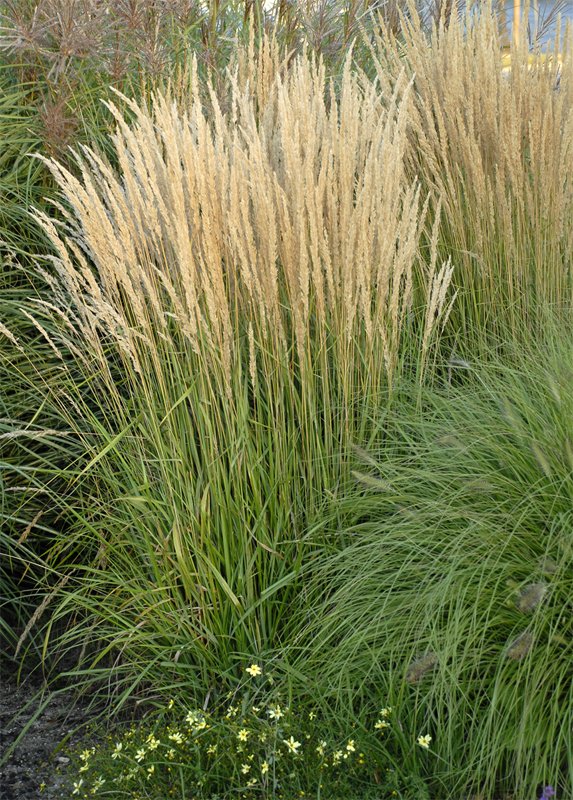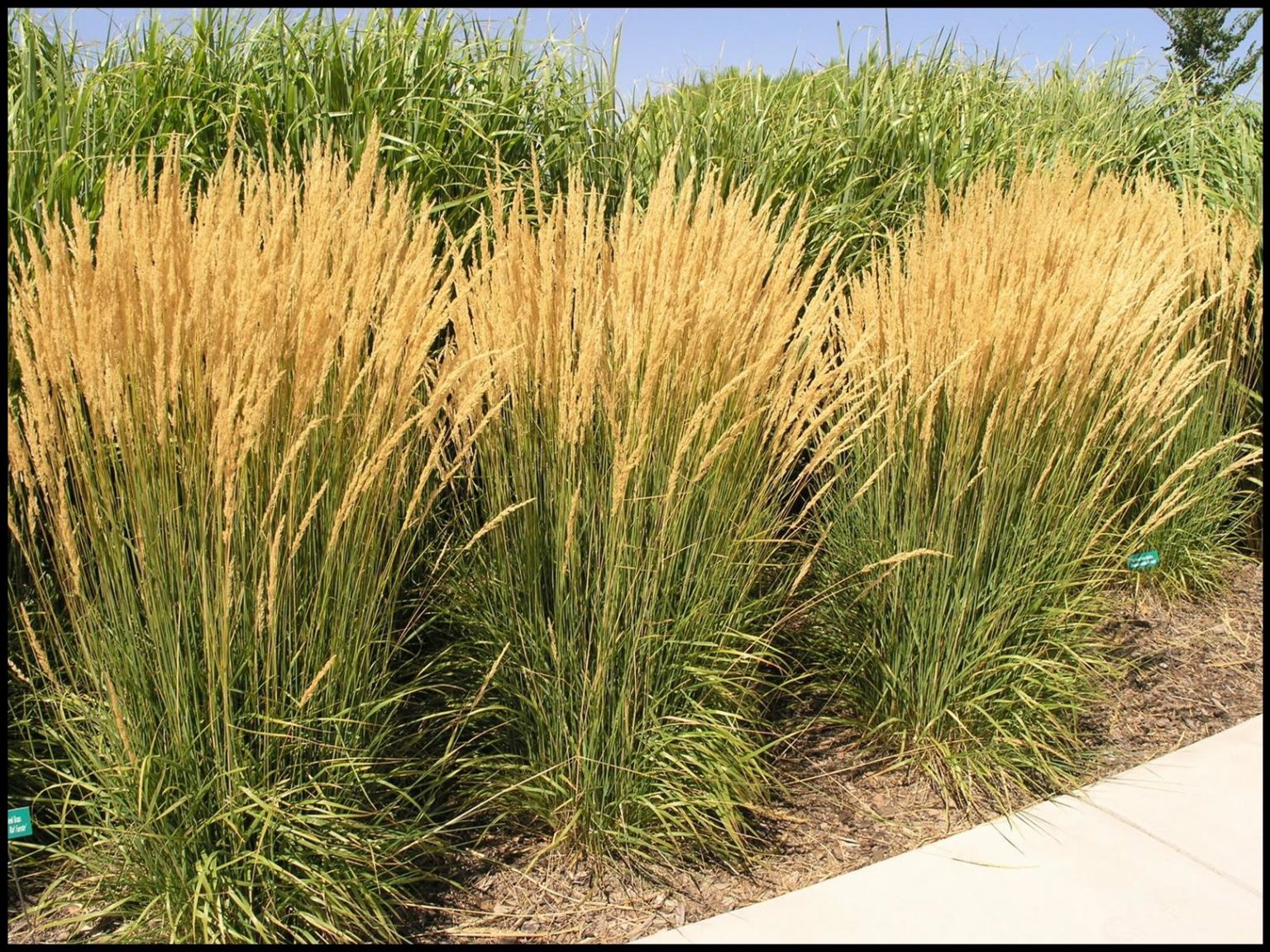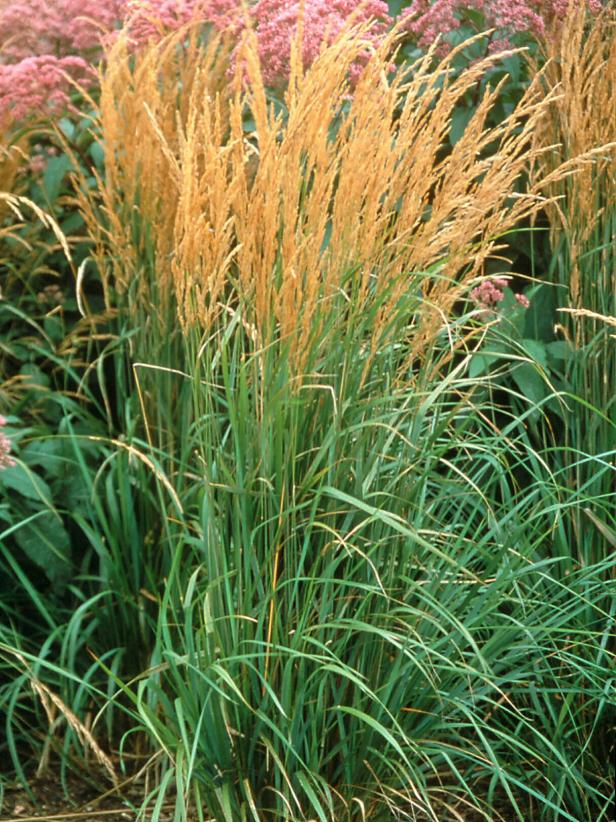
Buchs und Gräser (hier Landreitgras Calamagrostis acutiflora 'Karl Förster') im winterlichen
Karl Foerster feather reed grass is a type of ornamental grass that has a stiff, upright growth habit. In the north, its foliage remains green into late fall, at which point it turns a golden-tan color. In the south, it is evergreen. But an even bigger selling point than its attractive foliage is its flower heads.

Karl Foerster Feather Reed Grass Colorado Yard Care
How to Plant, Grow, and Care for Karl Foerster Grass 2.58M 1.1M 2.8M 902K 85.1K Categories Shop Edible Gardening Companion Planting Fruits Grains Harvesting Microgreens Nut Trees Vegetables Ornamental Gardening Bulbs Cacti & Succulents Flowers Foliage Ground Cover Houseplants Shrubs Trees Vines Soil & Compost Mulching Fertilizers Soil Improvement

Reitgras 'Karl Förster' Native Plants
A cool season grass, 'Karl Foester' is upright and clump forming, with purplish-green, feathery plumes to 6'. It distinctively blooms in early summer rather than fall and must have winter chill to bloom. Long lived — 25 years or more. -Santa Rosa Gardens. Noteworthy Characteristics Considered drought tolerant and deer resistant once established.

'Karl Foerster' Feather Reed Grass Great Garden Plants Ornamental grass landscape, Privacy
Karl Foerster, son of a painter and an astronomer, was well known for his unique and innovative plant selections at his nursery in Potsdam-Bornim, Germany. The nursery focused on breeding hardy perennials from all over the world.

Calamagrostis 'Karl Foerster' Feather Reed Grass ubicaciondepersonas.cdmx.gob.mx
Earning not only the 2001 Perennial of the Year award but also the Royal Horticultural Society's Garden of Merit, 'Karl Foerster' tolerates a variety of locations and grows well in zones 5-11. It enjoys full to partial sun and is best placed in the garden where it can be easily visualized and appreciated. When the collection near our seat.

Karl Foerster Feather Reed Grass ubicaciondepersonas.cdmx.gob.mx
Description. 2001 Perennial Plant of the Year 48-60" tall x 24" wide (division propagated). Rather drought tolerant (but not quite xeric) and tolerating a wide range of garden soils. Feather Reed Grass has a wonderful upright growth habit, making it very useful to place behind perennials with a spreading or rounded shape.

KARL FOERSTER FEATHER REED GRASS Hinsdale Nurseries
Karl Foerster - Feather Reed Grass - Calamagrostis acutiflora | Proven Winners Karl Foerster Feather Reed Grass Calamagrostis acutiflora (12) 5 7 4 4 3 2 1 1 See all reviews Exposure Part Sun to Sun Flower Season Spring Summer Mature Size 6' 3' Height: 4' - 6' Spread: 2' - 3' Plant is not sold online. Please try a local retailer.

PLANTS & RIDICULOUSNESS February 2014
Karl Foerster Grass, Calamagrostis x acutiflora, is a cool season ornamental grass that makes a great contrasting element with low growing flowering shrubs and perennial plants. The Karl Foerster ornamental grass can be uses as a specimen, for borders or as hedges or screens and makes a good backdrop for colorful shrubs such as roses. In 2001.

Reitgras Karl FörsterCalamagrostis acutiflora Plantes et jeunes pousses de plantes vivaces
Karl Foerster feather reed grass is a cool-season grass that's known to be versatile, attractive, and low-maintenance. If your location is under agriculture plant hardiness zones 3 to 9, growing Karl Foerster grass will be easy for you. Let's get to know this plant more. PLANT NAME: Calamagrostis x acutiflora 'Karl Foerster'

PflanzenKölle Reitgras 'Karl Förster', 11 cm Topf. Das dekorative Ziergras versprüht einen
One of the most popular ornamental grasses worldwide, Calamagrostis x acutiflora 'Karl Foerster' (Feather Reed Grass) is a majestic ornamental grass, highly valued for its erect feathery flower plumes, moving gracefully with even the slightest breeze.

Graminées décoratives en 20 idées pour embellir la maison ! Grasses landscaping, Ornamental
Karl Foerster grass grows to a height of 36-60 inches and a spread of 24-36 inches. As a result, it is critical to provide enough space for the grass to develop without crowding out other plants or structures. Karl Foerster grass is normally spaced between 18 and 24 inches apart. This permits the grass to grow and spread without encroaching on.

13 Terrific Tall Grasses Ornamental grasses, Tall ornamental grasses, Feather reed grass
Karl Foerster feather reed grass ( Calmagrostis x acutiflora 'Karl Foerster') is an excellent specimen around ponds, water gardens, and other moisture-laden sites. It is hardy throughout the USDA zones 5 to 9 and has no serious pest or disease problems.

Grass, Feather Reed Karl Foerster lupon.gov.ph
Planting Karl Foerster Grass. Dig a planting hole in the prepared site that is the same depth as the nursery pot but twice as wide, spaced 1 to 3 feet apart. Karl Foerster grass spreads via rhizomes and can become root-bound if it was grown in its nursery pot for a long time, so it is important to inspect the roots before planting.

13 Terrific Tall Grasses HGTV
Karl Foerster ( Calamagrostis x acutiflora 'Karl Foerster') is a feather reed grass, an ornamental clump-forming grass that grows in USDA Zone 4 and southward. It is named for a German horticulturist and an early pioneer of lower maintenance gardening. Karl Foerster was born in Berlin in 1874 and lived and gardened until 1970.

Karl Foerster Grass Ornamental Grass for Sale PlantingTree
'Karl Foerster' Feather Reed Grass creates a dramatic garden accent, with tall, slender, vertical growth and feathery plumes of shifting bronze color that stay in place year-round. An early bloomer, 'Karl Foerster' is a cool season grass that grows most rapidly in the spring season and produces notably early blooms.

Reitgras Calamagrostis acutiflora Karl Förster Ziergras GartenReitgras Karl Förster Sandrohr
Karl Foerster Grass, botanically called Calamagrostis x acutiflora 'Karl Foerster' (ka-la-mo-GROSS-tis, ak-yoo-tih-FLOR-uh), is a hybrid of two plant species - C. epigejos and C. arundinacea, both indigenous to Asia and Europe. It is believed a famous German nurseryman, Karl Foerster - found the plant in the Hamburg Botanical Garden in the 1930s.